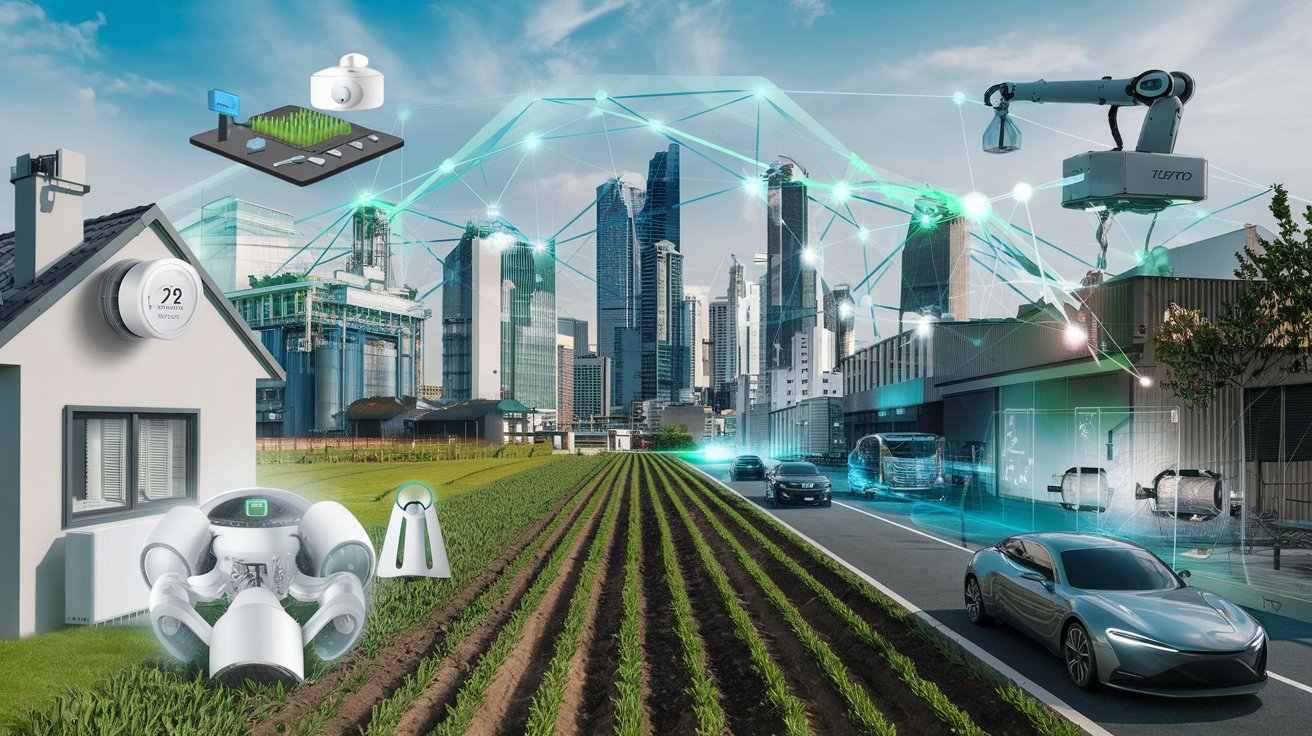The Internet of Things (IoT) is revolutionizing our world, connecting physical devices to the internet and enabling data exchange. For businesses, IoT opens doors to unparalleled automation, efficiency, and growth. In this article, I’ll guide you through IoT’s transformative applications in smart homes, smart cities, agriculture, and manufacturing—all key areas to consider for future-focused business leaders.
What is the Internet of Things (IoT)?
IoT refers to the network of physical objects embedded with sensors, software, and other technologies to exchange data with other devices and systems over the internet. These objects range from household appliances and vehicles to industrial machinery. IoT aims to make life more efficient by enabling devices to work together seamlessly.
Key Benefits of IoT in Business
- Increased Efficiency: Automate processes to reduce human intervention.
- Data Insights: Gather valuable data for predictive analysis.
- Enhanced Customer Experience: Personalize services based on customer preferences.
- Cost Reduction: Reduce operational costs with precise control over resource usage.
1. IoT in Smart Homes
IoT is transforming homes into smart ecosystems where devices communicate to improve comfort, security, and energy efficiency.
Smart Home Automation
Smart homes enable homeowners to control and automate systems such as lighting, heating, and appliances via smartphones or voice assistants.
- Energy Management: Smart thermostats adjust temperature based on occupancy, reducing energy bills.
- Home Security: IoT-powered cameras and sensors provide real-time monitoring and alerts, giving homeowners peace of mind.
- Voice Assistants: Devices like Amazon Alexa and Google Home integrate with IoT gadgets to offer hands-free control over various home functions.
Benefits for Businesses in the IoT Smart Home Market
- Consumer Insights: Businesses can track usage patterns and develop personalized services.
- Energy-Efficient Products: Manufacturing energy-saving devices positions companies as sustainable brands.
2. IoT in Smart Cities
Smart cities use IoT to tackle urban challenges, aiming to enhance efficiency, safety, and sustainability.
Applications of IoT in Smart Cities
- Traffic Management: IoT sensors and cameras monitor traffic flow, reducing congestion by providing real-time traffic updates.
- Smart Lighting: IoT-enabled streetlights automatically adjust brightness based on the presence of pedestrians or vehicles, saving energy.
- Waste Management: Smart bins notify waste collection services when they’re full, optimizing waste collection routes.
Benefits for Businesses in Smart Cities
- Innovation Opportunities: Companies can develop innovative solutions like smart parking or air quality monitoring systems.
- Public-Private Partnerships: Collaborate with governments for IoT projects, expanding market reach.
3. IoT in Agriculture
IoT technology enables precision farming, helping farmers maximize productivity, conserve resources, and improve crop quality.
Smart Agriculture IoT Applications
- Soil Sensors: These sensors monitor soil moisture, temperature, and nutrient levels, giving farmers precise data on crop needs.
- Drones: Equipped with IoT sensors, drones provide aerial views of crops, helping farmers detect irrigation and pest issues.
- Automated Irrigation: IoT-enabled irrigation systems water crops based on real-time weather and soil data, preventing water wastage.
Benefits for Businesses in Smart Agriculture
- New Product Lines: Create IoT-based farming tools to meet rising demands for precision agriculture.
- Increased Market Share: The agtech market is expanding rapidly, providing new business opportunities.
4. IoT in Manufacturing
IoT is pivotal in Industry 4.0, where connected machinery optimizes manufacturing processes, reduces costs, and enhances product quality.
Industrial IoT Applications
- Predictive Maintenance: IoT sensors monitor machine health, predicting and preventing failures to avoid costly downtimes.
- Supply Chain Management: IoT devices track inventory, reducing waste and improving supply chain efficiency.
- Quality Control: IoT-enabled devices continuously monitor product quality, ensuring high standards with minimal human intervention.
Benefits for Businesses in IoT-Driven Manufacturing
- Reduced Downtime: Predictive maintenance keeps production lines running smoothly.
- Enhanced Productivity: IoT automation speeds up processes, allowing businesses to scale faster.
Challenges and Considerations for Businesses in IoT Integration
While IoT offers immense potential, there are challenges to address:
- Security Risks: More connected devices mean more entry points for cyberattacks.
- Data Privacy: Ensure that IoT data collection complies with GDPR and CCPA regulations.
- Initial Investment: IoT setup costs can be high, although long-term savings often outweigh initial expenses.
How to Successfully Implement IoT in Your Business
- Assess Business Needs: Determine which areas can benefit most from IoT.
- Select the Right Technology: Choose IoT platforms and devices that suit your industry.
- Partner with Experts: Collaborate with IoT specialists to ensure smooth implementation.
- Focus on Security: Use secure protocols and regularly update devices to safeguard data.
Future Trends in IoT
The IoT landscape is constantly evolving, with new trends emerging to further enhance business applications.
- 5G Integration: With 5G, IoT devices will have faster connections and lower latency, improving real-time data processing.
- Edge Computing: By processing data closer to the source, edge computing will make IoT systems faster and more reliable.
- AI and Machine Learning: AI-enabled IoT systems can learn from data patterns, offering even more automation and predictive insights.
Embrace IoT to Future-Proof Your Business
Incorporating IoT into your business strategy can unlock powerful opportunities, whether in smart homes, cities, agriculture, or manufacturing. As a business coach in this sector, my advice is to stay proactive, informed, and adaptive. IoT is more than a trend; it’s a transformative force. Start small, focus on value, and scale your IoT capabilities as your business grows. With the right approach, IoT can be the catalyst for your next phase of growth and innovation.
Embrace the future with IoT. Implementing this technology can streamline operations, reduce costs, and set your business apart in an increasingly connected world.


